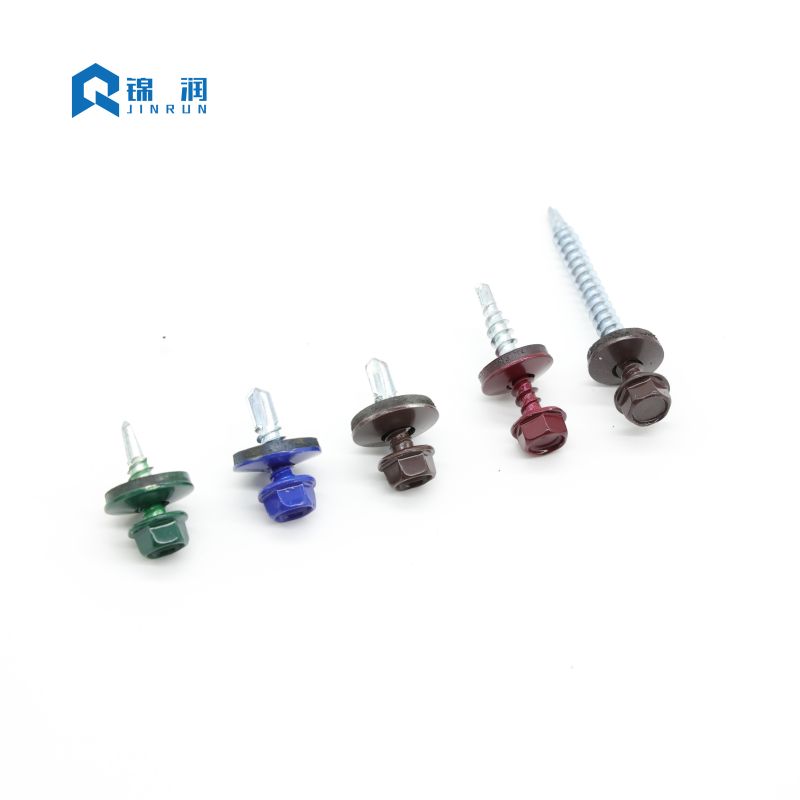Why Are Self-Drilling Screws a Game Changer in Construction and Manufacturing?
2025-01-07
In the world of construction, manufacturing, and DIY projects, the right fastener can make all the difference. When it comes to efficiency, strength, and versatility, self-drilling screws have become an essential tool. But why exactly are self-drilling screws considered a game changer? In this blog, we’ll explore the benefits of these screws, their unique features, and why they’ve become so popular across various industries.
What Are Self-Drilling Screws?
Self-drilling screws, often referred to as Tek screws (a brand name that has become synonymous with the product), are fasteners that combine a screw and a drill bit into one tool. These screws feature a pointed tip that eliminates the need for a pre-drilled hole. The self-drilling mechanism allows the screw to penetrate and securely fasten materials like metal, wood, and plastic without the need for additional tools or pre-drilling.
The screw’s sharp point, combined with a unique thread design, allows it to create its own hole as it is driven into the material. This results in a secure and precise fit, making them particularly useful in applications where speed and efficiency are critical.
Why Are Self-Drilling Screws So Popular?
1. Time and Labor Savings:
One of the biggest advantages of using self-drilling screws is the significant time-saving they offer. Traditional screws require a pre-drilled hole to create a secure fit, but self-drilling screws eliminate this step. This allows workers to complete tasks much faster, especially in large-scale construction and manufacturing projects. In industries where time is money, this efficiency is invaluable.
2. Ease of Use:
The self-drilling feature makes these screws much easier to use compared to traditional screws. Workers don’t need to worry about aligning a drill bit or ensuring the hole is the right size. The screw essentially “drills” its own hole as it is driven in, which can be particularly beneficial for those working on large projects or for DIY enthusiasts without specialized tools.
3. Increased Precision:
Because self-drilling screws don’t require a pre-drilled hole, there is less chance of misalignment. The sharp point and thread design help ensure that the screw penetrates the material accurately, reducing the likelihood of crooked or unstable installations. This precision is particularly important in applications such as roofing, metalworking, and electrical installations.
4. Versatility Across Materials:
Self-drilling screws are incredibly versatile and can be used in a variety of materials, including wood, metal, plastic, and composite materials. This versatility makes them ideal for a wide range of industries, from automotive manufacturing to home construction. The screws can be designed with specific coatings to enhance their ability to work with different materials, ensuring a secure fit regardless of the surface.
5. Improved Hold and Strength:
The threads on self-drilling screws are designed to provide a strong grip, which improves their ability to hold materials together. This makes them ideal for applications where a high level of security and durability is needed. For example, they are commonly used in metal-to-metal fastening, where traditional screws might not provide the same level of strength.
6. Cost-Effective:
Although self-drilling screws might be slightly more expensive than regular screws, their ability to eliminate the need for a pre-drilled hole means fewer tools and steps are required during installation. This can lead to savings on labor and equipment costs over time. Additionally, since they reduce the likelihood of errors or the need for rework, self-drilling screws can contribute to a more cost-effective and efficient process overall.
7. Reduced Risk of Material Damage:
When installing traditional screws into hard materials, there's a risk of cracking, splitting, or damaging the surface, particularly when dealing with metals or dense wood. Self-drilling screws, due to their design, minimize the risk of such damage by allowing for smoother, more controlled penetration. This is particularly important when working with delicate or expensive materials that need to remain intact.
Applications of Self-Drilling Screws
1. Metal Roofing and Siding:
One of the most common uses of self-drilling screws is in the installation of metal roofing and siding. These screws are specifically designed to penetrate and secure metal sheets to structural beams or supports. Because of their ability to drill through metal, they are ideal for roofing contractors who need to work quickly and efficiently.
2. Construction:
Self-drilling screws are often used in the construction of steel and wood frames, particularly in structural applications. They are ideal for fastening steel studs to framing systems, providing a secure and durable connection that’s easy to install. In this industry, where strength and speed are key, these screws are highly valued.
3. Automotive Industry:
In the automotive sector, self-drilling screws are used for assembly, attaching various metal parts and components together. They are essential for ensuring that parts are securely fastened while maintaining the structural integrity of the vehicle. The screws’ ability to work with metal components without requiring pre-drilling makes them an excellent choice for assembly lines.
4. Electrical Installations:
Electrical installations often require the attachment of various components to metal panels or structures. Self-drilling screws are perfect for this application, as they can drill through metal surfaces and provide a secure connection for electrical devices, junction boxes, and other hardware.
5. Furniture Assembly and DIY Projects:
DIY enthusiasts often use self-drilling screws for home improvement projects, such as assembling furniture or building wooden structures. The ease of use and time-saving benefits make them a popular choice for individuals who want to complete projects quickly and with a professional finish.
Types of Self-Drilling Screws
1. Zinc-Plated Self-Drilling Screws:
These screws are coated with a layer of zinc to provide corrosion resistance. They are ideal for use in environments where exposure to moisture or harsh conditions is a concern.
2. Stainless Steel Self-Drilling Screws:
Stainless steel screws are even more resistant to corrosion than zinc-plated screws, making them a great option for use in environments with high humidity or exposure to chemicals.
3. Coated Self-Drilling Screws:
Some self-drilling screws come with additional coatings, such as epoxy or ceramic coatings, to enhance their resistance to wear and corrosion. These coatings can also help reduce friction during installation, making the screws easier to drive in.
4. High-Strength Self-Drilling Screws:
High-strength self-drilling screws are designed to handle heavy-duty applications, such as metal-to-metal fastening in demanding environments. These screws are made from materials like hardened steel to provide extra strength and durability.
How to Choose the Right Self-Drilling Screw
Choosing the right self-drilling screw depends on several factors, including the material you’re working with, the required strength, and environmental conditions. Here are a few considerations to keep in mind:
1. Material Type:
Different screws are designed to work with different materials. Make sure to choose screws that are suited for the material you're fastening, whether it’s metal, wood, or plastic.
2. Thread Type:
The thread design of the screw will affect its holding power. Fine-thread screws are typically used for softer materials like wood, while coarse-thread screws are ideal for harder materials like metal.
3. Coating:
Consider the environmental conditions of your project. If you're working in a corrosive environment, choose screws with coatings like zinc or stainless steel for better corrosion resistance.
4. Size and Length:
The size and length of the screw will depend on the materials you're fastening and the required depth of penetration. Choose a screw that will penetrate deeply enough to provide a strong hold.
Conclusion: A Must-Have for Modern Fastening
Self-drilling screws are a vital tool in modern construction, manufacturing, and DIY projects. Their ability to save time, improve precision, and reduce the need for additional tools makes them an invaluable asset for anyone working with metal, wood, or other materials. Whether you're building a house, assembling furniture, or working on an automotive project, self-drilling screws can help ensure that your work is done quickly, accurately, and securely.
By understanding the various types of self-drilling screws and their applications, you can select the right fasteners for your project, improving both the efficiency and quality of your work.



